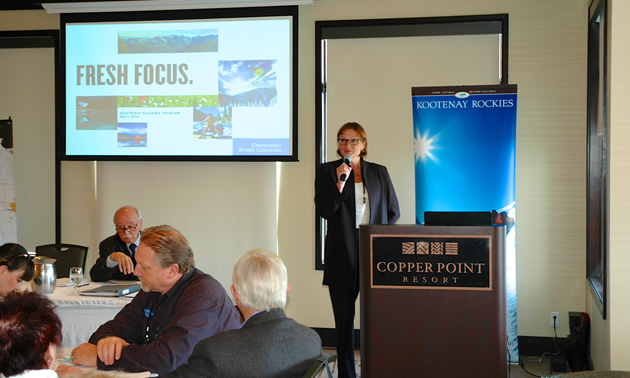Destination BC’s new CEO wants a fresh focus for tourism
Marsha Walden spoke at the recent Kootenay Rockies Tourism Industry Conference held at Invermere’s Copperpoint Resort.

New Destination BC CEO Marsha Walden addresses the Kootenay Rockies Tourism Industry Conference. — Photo courtesy Shannon Harrison, Kootenay Rockies Tourism
A fresh focus was the theme of Marsha Walden’s presentation at the recent Kootenay Rockies Tourism Industry Conference held at Invermere’s Copperpoint Resort. Walden is the president and CEO of Destination British Columbia, a position she has held for the last 10 months.
Her goal is to put British Columbia on the tourism map along with global success stories like Queensland, Australia, and the country of New Zealand. She decried the fact that Canada has slipped from eighth place in 2002 as the world's most popular visitor’s destination to its current position of 16th. Canada is being outpaced by the likes of Turkey, one of the hot new destinations in the world and now ranked as the sixth most popular place to visit.
The economic impact of tourism to British Columbia is quite staggering, and it is often the first way people experience the province. Tourism, Walden stated, makes viable things like museums, art galleries, airlines and a host of other business categories.
Tourism is big business in B.C., generating $13.5 billion in revenue, $3.2 billion in export revenue and $1.2 billion in tax revenue, and it employs 127,000 people at some 18,000 tourism-related businesses.
B.C. is seeing a resurgence with visitation from the United States (up 5 per cent), Australia (up 2 per cent) and China (up a whopping 26 to 30 per cent), which recently granted official destination status to the province.
As CEO of this important sector of the economy, Walden wants more investment in marketing which she says stands at just over $90 million of which less than 50 per cent goes directly in marketing the province. It is her goal to revitalize B.C.’s brand appeal, currently SuperNatural British Columbia, which she will do with a forthcoming announcement slated for an industry conference on November 4.
Walden explained she has a vision that B.C.’s tourism marketing should be generated from remarkable experiences and promote a “willingness to recommend.” This could be accomplished through better collaboration and by outsmarting the competition and not by outspending them. Success would generate a stronger return on investment back to the sector.
She suggested this could be accomplished by increasing co-op funding in all regions, decentralizing access to funds, establishing multi-year funding agreements, creating great strategic alignment and establishing market management flexibility.
Destination development was also high on Walden’s list, which would enhance long-term competitiveness, encourage strategic investment and spur on even more remarkable experiences. This all adds up to a fresh focus and a big opportunity for tourism in British Columbia.
In a subsequent presentation, Ian Robertson, Executive Director of the Tourism Industry Association of British Columbia (TIABC), acknowledged that B.C.’s tourism sector should brace itself for a major shake-up. There was widespread concern expressed over the uncertainty being created by this major reshuffling and the apparent lack of consultation with industry sectors and regions.
Exactly what a fresh focus in tourism means should become clearer when Destination BC rolls out its new strategic brand and plan on November 4 and in a following 12-city roadshow around the province to showcase its new strategy.






Comments